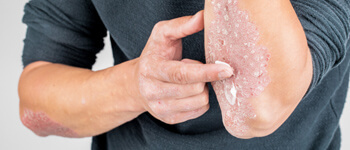Atopic dermatitis is commonly referred to as eczema. It is a condition that results in inflammation of the skin and causes itchiness, cracking and roughness.
For especially aggressive cases of eczema, stronger remedies like topical medications may have to be utilized. However, most cases of eczema are usually mild and can be managed with appropriate treatment and moisturizers.
In this blog, we’ll explain how to use moisturisers for dermatitis, along with some other tips and tricks to help manage the condition. But first, let’s understand what causes atopic dermatitis.
Understanding Atopic Dermatitis And Its Causes
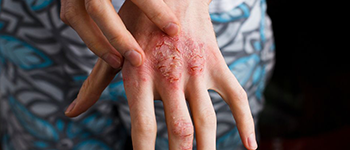
Eczema can persist for long periods, and its symptoms can return due to other skin conditions or triggers such as pollution, fragrances, and food items such as dairy and nuts.
Eczema is usually genetic but is also caused due to multifarious environmental factors. Some of these factors include:
- Irritants such as toiletries that contain fragrances, soaps, washing powder, alcohol, and germicides
- The presence of microbes and viruses, allergens such as pollen, dust, mites, pet hair, and fungus
- Not maintaining proper hygiene habits such as not showering after exercising and sweating
- Hormonal changes during a menstrual cycle
The Dangers Of Dry Skin For Dermatitis
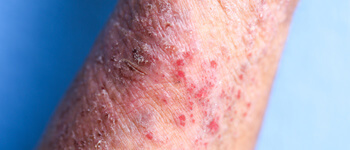
Dry skin can worsen symptoms of atopic dermatitis. It not only increases the presence of cracked, sore, and flaky skin but also causes itchiness. This can make you subconsciously scratch the affected skin, further worsening the condition.
Hence, it is important to keep skin moisturized at all times. Using a humidifier to help alleviate the effects of a dry environment on your skin also helps.
Using a moisturizer helps lock in the skin’s existing moisture, thereby preventing the development of severe atopic dermatitis.
Which moisturiser Should You Use?
There are many moisturizers that help relieve symptoms of eczema, but most of them can be listed into three categories depending on their oil content: ointments, creams, and lotions.
As a rule of thumb, the more oil content present in the moisturisers, the more your skin stays protected against dry and inflamed skin.
-
- Ointments
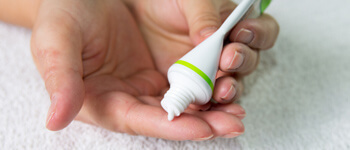
Ointments are preferable in extremely dry areas or colder environments. Due to them being heavy, people staying in hot and humid areas do not prefer ointments for treating their dermatitis condition.
-
- Creams

If you do not prefer the greasy and heavy texture of ointments or reside in a hot and humid environment, consider applying cream instead.
-
- Lotions
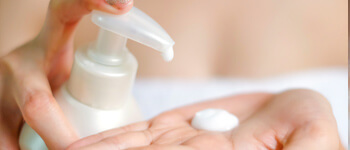
If you have eczema and use lotions, your skin will not get the moisture it needs and dry out quickly, leading to inflamed and itchy skin.
How to Relieve Eczema With Moisturiser
Here’s a guide on how and when to use moisturizer for dermatitis:
- Try to apply moisturizer within three minutes of taking a shower. If moisturizer is not applied soon after a bath, your skin will dry out very soon and start to become flaky and itchy.
- Whenever your skin starts to feel dry, itchy, or inflamed again, reapply a layer of moisturizer. Make sure your hands are clean to avoid infection.
- While applying moisturizer to the affected areas, apply a moderately thick layer in a downward direction. There is no need to massage the moisturizer into the skin as it will get absorbed eventually.
It is best to seek a dermatologist’s advice before choosing the right moisturizer to relieve symptoms of atopic dermatitis. However, as a rule of thumb, always read the ingredients list and rule out moisturizers that contain irritants such as fragrances, perfumes, dyes, etc., as they can aggravate itchiness and dryness.
How To Treat Eczema
Eczema conditions such as atopic dermatitis can be a continuing or a relapsing problem for many. Eczema is very common in infants and children and usually gets better with age, with symptoms going away by the time adolescence kicks in.
Treatment is not always successful, and symptoms can reoccur. However, you can manage mild eczema with the following skin care tips:
-
- Barrier Repair Moisturisers
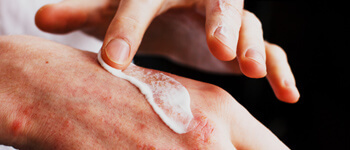
Barrier repair moisturisers usually come in the form of ointments. They protect sensitive skin for longer periods of time against environmental stressors that harm the skin’s natural barrier, leading to loss of moisture.
-
- Antibiotic Medications

Scratching on itchy skin which is already affected may lead to cracked, highly inflamed, and sore skin. This could result in an infection, thereby requiring antibiotic creams and pills to treat it.
-
- Foods to Avoid During Eczema
If you’re suffering from eczema, then it is best to avoid eating the following food items:
-
-
- Dairy
-
-
-
- Nuts
-
-
-
- Gluten-rich food
-
-
-
- Soy and soy products
-
-
-
- Citrus fruits
-
-
-
- Eggs
-
-
-
- Certain spices such as clove and cinnamon
-
-
-
- Any food items that could trigger an allergic reaction
-
Instead, opt for food items rich in anti-inflammatory properties, omega-3 fatty acids, and probiotics to treat the symptoms of eczema.
In Conclusion
If you notice patches of dry and inflamed skin on your body, there’s a good chance you have eczema or atopic dermatitis. This skin condition is usually mild and can be easily controlled if the dryness is treated.
Using a good moisturizer is the best way to keep dry, itchy, and flaky skin at bay. However, to combat the symptoms of dermatitis, it is equally important to pick a moisturizer that perfectly suits your skin.
A dermatologist can help you choose the best product to control the symptoms. Schedule an appointment with a qualified skincare expert and explore other useful skin care tips on Skin & Hair Academy.


